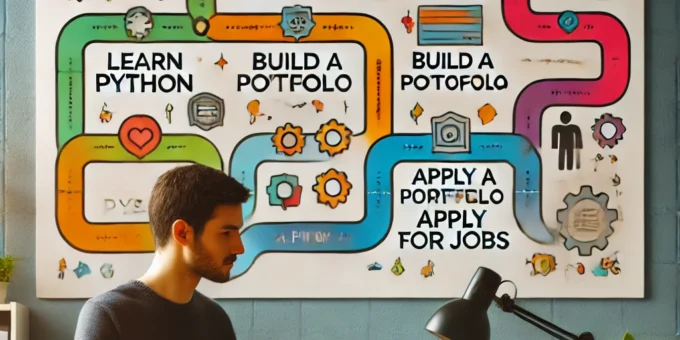
The tech industry offers vast opportunities for anyone willing to acquire the skills necessary to thrive in this ever-evolving field. Learning to code is the cornerstone of entering this space, providing you with the tools to create, innovate, and problem-solve. Whether you’re looking to build apps, design websites, or analyze data, coding is your gateway. This guide is your blueprint for mastering coding and unlocking the doors to a fulfilling career in technology.
Why Learn Coding?
Coding is a skill that not only boosts your employability but also empowers you to think critically and solve problems. Here’s why it’s worth your time:
- High Demand: Developers are needed across industries.
- Flexible Careers: Work as a freelancer, join startups, or become part of tech giants.
- Lucrative Opportunities: Tech roles often come with competitive salaries.
- Future-Proofing: Coding keeps you relevant in a tech-driven world.
Understanding the Basics of Coding
Before diving into coding, grasp these foundational concepts:
- Programming Languages: Start with beginner-friendly languages like Python or JavaScript.
- Syntax: Learn the rules and structure of writing code.
- Logic and Algorithms: Develop the ability to break down problems into steps.
- Debugging: Practice finding and fixing errors in your code.
Choosing the Right Programming Language
Selecting a language depends on your interests and goals:
- Web Development: HTML, CSS, JavaScript.
- Data Science and AI: Python, R.
- Mobile Development: Swift (iOS), Kotlin (Android).
- Game Development: C++, C#.
Essential Tools for Coding
Equip yourself with these must-have tools to streamline your learning:
- Text Editors: Start with beginner-friendly editors like VS Code.
- Version Control: Use Git and GitHub for collaboration and tracking changes.
- Compilers: Translate code into executable programs.
- Online Sandboxes: Experiment with code in environments like Replit or CodePen.
Building a Solid Learning Plan
To stay focused and efficient, create a step-by-step roadmap:
- Set Goals: Define what you want to achieve, such as building a website or mastering Python.
- Follow a Curriculum: Use structured resources like freeCodeCamp or Codecademy.
- Practice Daily: Dedicate at least 30 minutes daily to coding.
- Seek Feedback: Share projects and ask for feedback from the coding community.
Free and Paid Learning Resources
Explore these platforms to gain coding skills:
- Free Resources:
- freeCodeCamp
- Khan Academy
- The Odin Project
- Paid Resources:
- Coursera
- Udemy
- Pluralsight
Joining Coding Bootcamps
Bootcamps offer intensive training for those seeking rapid results:
- Advantages: Structured, hands-on learning, and career support.
- Top Bootcamps: General Assembly, Flatiron School, Le Wagon.
- Costs and Scholarships: Research financial aid options to make bootcamps affordable.
Gaining Practical Experience
Knowledge without application is incomplete. Here’s how to build experience:
- Personal Projects: Create websites, apps, or games to showcase your skills.
- Open Source Contributions: Collaborate on projects on GitHub.
- Freelancing: Offer your services on platforms like Upwork or Fiverr.
Building a Portfolio
A strong portfolio can set you apart in job applications:
- Highlight Projects: Showcase 3-5 standout projects.
- Write Case Studies: Explain the problem, your approach, and the outcome.
- Make It Accessible: Host your portfolio on platforms like GitHub Pages.
Networking in the Tech Industry
Connections can open doors to job opportunities:
- Attend Meetups: Join tech events and hackathons.
- Leverage LinkedIn: Connect with industry professionals.
- Join Online Communities: Participate in forums like Reddit or Discord channels.
Finding Your First Job in Tech
Landing a tech job involves preparation and persistence:
- Polish Your Resume: Highlight your coding projects and skills.
- Apply Strategically: Target entry-level roles like junior developer positions.
- Ace Interviews: Prepare for coding challenges and behavioral questions.
FAQs
How long does it take to learn coding?
The timeline varies, but with consistent effort, you can gain a basic understanding in 3-6 months.
Can I learn coding without a degree?
Absolutely! Many successful developers are self-taught or bootcamp graduates.
What’s the best age to start learning coding?
It’s never too late to start coding; people of all ages have entered the tech industry successfully.
Is coding hard to learn?
While challenging at times, coding becomes easier with practice and persistence.
How can I stay motivated while learning coding?
Set achievable goals, celebrate small wins, and connect with other learners for encouragement.
Do I need advanced math skills to code?
Not necessarily. Basic math suffices for most programming tasks.
You Can Also Read : How to Troubleshoot Common Issues With Your Devices
Conclusion
Learning to code is a transformative journey that unlocks countless opportunities in the tech industry. By starting with the basics, leveraging available resources, and building real-world experience, you can transition into a rewarding tech career. Stay curious, consistent, and confident—you’ve got this!
